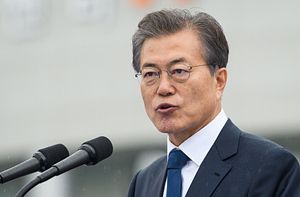From September 12 to 14, South Korea hosted the latest iteration of its Seoul Defense Dialogue (SDD), an annual defense forum launched back in 2012. While inter-Korean relations were a key point of conversation among the participants present given the upcoming summit the following week, the SDD also saw Seoul seek to continue advancing its ties with Southeast Asia and ASEAN as part of its New Southern Policy under President Moon Jae-in.
As I have noted before in these pages, one of Moon’s early priorities since coming to office had been a pledge to increase South Korea’s focus on Southeast Asia and ASEAN still further (See: “What Does Moon’s Southern Policy Mean for ASEAN-South Korea Relations”). Despite ongoing challenges and uncertainty among some in the region, we have seen a number of promising early moves since then, including on the security side.
This year’s iteration of the SDD presented another opportunity to build out ASEAN-South Korea defense ties. Officially, in one of the several sidelines events tied to the SDD, South Korea and ASEAN countries held separate vice-ministerial talks to discuss defense cooperation as Seoul seeks to develop its New Southern Policy. During that meeting, South Korea’s Deputy Defense Minister Suh Choo-suk reemphasized that ASEAN was a key priority within the New Southern Policy, and that Seoul continued to pursue defense collaboration with Southeast Asian states across a wide range of areas as well as mechanisms to formalize ties in this respect, including annual meetings and defense cooperation agreements.
The occasion also saw South Korea boost ties with individual countries. Some of these were with countries where activities have already been active. Vietnam was a case in point. On the SDD itself, Vietnam’s Deputy Defense Minister Nguyen Chi Vinh was the ASEAN voice on the panel addressing maritime security challenges, and Vietnamese and South Korean officials also met on the sidelines to address defense issues ahead of their dialogue later this year. Beyond the SDD, during the week the meeting was being held, an ROK navy destroyer was also on a four-day visit to Danang, the second voyage of its kind following the previous one last September.
Other activities were with smaller Southeast Asian states with which Seoul is looking to further build out defense ties. For instance, South Korea concluded a new defense agreement with Brunei, where security collaboration has traditionally lagged other elements of those relationships. The new pact and the increased momentum in defense ties also comes just as Brunei assumes the role of coordinator country for ASEAN-South Korea relations.
Still other defense-related activities are ongoing but received less publicity at the SDD. For instance, a key security activity that will involve Southeast Asian states is the International Fleet Review, set to take place in Jeju in mid-October. Seoul also continues to work on strengthening ties with select Southeast Asian states on the security side, including Indonesia following President Joko “Jokowi” Widodo’s visit to South Korea just ahead of the SDD. And, multilaterally, Seoul is continuing on with initiatives as it plays its role as the holder of the co-chairman of the ASEAN Defense Ministers’ Meeting-Plus (ADMM-Plus) working group on maritime security.
To be sure, the SDD it just one opportunity to boost ASEAN-South Korea defense relations, and activities will continue through the year and beyond. But the activity tied to this round of SDD nonetheless provided a useful point to assess the inroads that Seoul is making in this effort as part of its wider New Southern Policy.
































